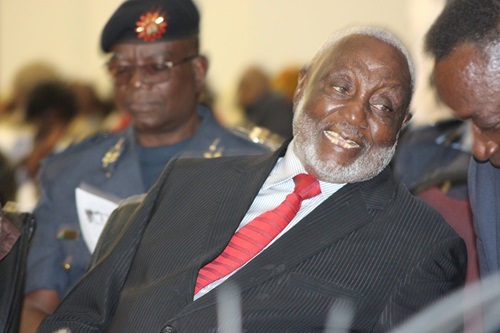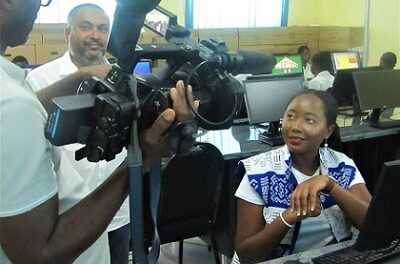By Shivute Kaapanda /
UUKWALUUDHI Traditional Authority, one of the eight traditional authorities in the four Oshiwambo-speaking northern regions of Namibia, was unaware of the Access to Information Act and its impact on their operations.
Under the leadership of King Josia Shikongo Taapopi, the 12th King of Uukwaluudhi, who ruled the kingdom for sixty-five years since 1959 after he was appointed by his Uncle King Mwaala waNashilongo, Uukwaluudhi’s influence in modern day Namibia is not insignificant.
Uukwaluudhi Traditional Authority has more vast communal lands compared to the neighbouring Ombalantu, Ongandjera and Uukolonkadhi traditional authorities, making it the one that is not only rich in most material respects, but also holds considerable power in the communal affairs of the western part of the four northern regions.
Situated in the western part of the former Ovamboland, in present-day Omusati Region, Uukwaluudhi shares borders with the Ongandjera to the south and Uukolonkadhi in the north.
The Uukwaluudhi royal homestead is situated adjacently in the small town of Tsandi which is the administrative centre of Uukwaluudhi.
Omutumwa newspaper was welcomed in Tsandi at Uukwaluudhi Traditional Authority’s office by a whole congregation of senior traditional leaders.
The purpose of the Omutumwa visit was to inquire and seek the traditional authority’s view on the Access to Information Act and how the Act will affect their operations as a public institution once the law becomes operational.
Spokesperson of Uukwaluudhi Traditional Authority, Wilbard Ndundu, who serves as a council advisor and a senior headman in the district of Tsandi, told Omutumwa that his office was unaware of such an Act.
“The traditional authority is run by a council, and the council is not an individual; all of us here constitute the council, and no one is aware of such an Act,” Ndundu stated. He suggested Omutumwa leave him with a copy of the Act so they could familiarise themselves with it.
He said that despite no prior consultations the Uukwaluudhi Traditional Authority would nevertheless welcome the law since it is aimed at regulating and governing public and private institutions in Namibia.
The Access to Information Act, Act no. 8 of 2022, is one which, once operational, will compel both private and public entities to open up and take full responsibility in ensuring that information is made easily accessible to the public.
The Act is a powerful tool in the hands of the citizens who can then demand their right to be informed.
Once he familiarised himself with the Act, Ndundu highlighted the importance of access to information in today’s information age for purposes of transparency of public affairs and for research and development.
He made it a point that once the Act is made operational the Uukwaluudhi Traditional Authority “will welcome, respect and practice that law.”
“The creation of legal instruments, especially in guiding and regulating public institutions, is good for democracy and social progress,” Ndundu emphasised.
He indicated that while Uukwaluudhi Traditional Authority has always tried to keep its affairs and activities open and transparent, the Access to Information Act may challenge some of the cultural practices and ways of doing things, since a traditional authority has a mandate to preserve and follow the ways of the ancestors.
“We the traditional council are caught up in a web of development and progress while trying to maintain our cultures and traditions, so that we will remain stagnant if we are unable to adapt to the changing world of development especially with regard to information sharing,” he said.
For them, it will have to be a wait-and-see once the law kicks into force before they could really say how Uukwaluudhi would fall into step according to the provisions of the Access to Information Act.
In the Photo: Uukwaluudhi King Josia Shikongo Taapopi.

[NB. This article was produced with the financial support of the Namibia Media Trust, through the New Voices, New Narratives in Public Policy Discourse project. Its contents are the sole responsibility of Omutumwa and do not necessarily reflect the views of the NMT nor any of its partners.]







